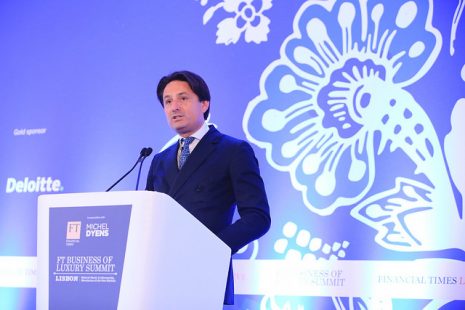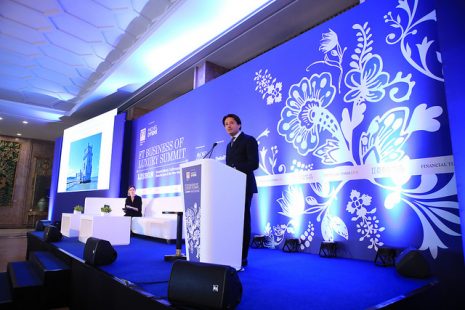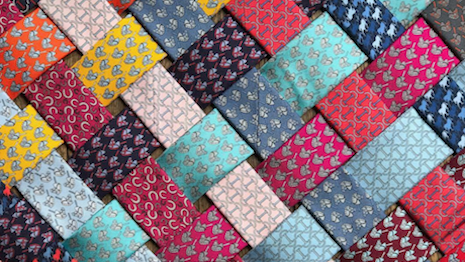LISBON, Portugal – Despite being an international brand faced with numerous options for cheaper manufacturing costs, 85 percent of Hermès’ production takes place in the house’s home country of France.
Speaking at the FT Business of Luxury Summit on May 15, Hermès CEO Axel Dumas spoke at length about the brand’s commitment to at-home production and the importance of investing in one’s own country. In an in-depth interview with FT’s fashion editor Jo Ellison, the two covered other interesting statistics relevant to Hermès’ production model.
The keynote and conversation were part of a summit organized and hosted by the Financial Times in Lisbon, Portugal where representatives from luxury brands around the world gathered to discuss the movements of the industry.
Skilled artisans
Hermès is one of the most well-known leather goods brands in the world and its designs routinely fetch high prices and high esteem.
Despite the overwhelming demand, Hermès has demonstrated a unique restraint, eschewing large production orders and focusing on small-scale, dedicated craftsmanship in Europe.
Where other brands may attempt to satisfy growing demands by creating even more pieces, Hermès has kept its numbers small, sometimes creating as few as 10 copies of one item.
Additionally, Hermès have focused on keeping the craft of creating their products as pure as possible. Rather than outsourcing production or having many workshops around the world, Hermès hosts the overwhelming majority of craftsmanship at home in France.

Hermès CEO Axel Dumas
Mr. Dumas spoke about the reason for this, citing the fact that producing its goods at home in France results in the best product. The entire production process originated in France and it is still where Hermès feels it can keep the best control over how its craftsmen work.
This extends beyond production and to the training of new craftsmen as well. The average age of an Hermès craftsman is 38, meaning that the brand keeps the same craftsmen on for a long time, who in turn pass their wisdom on to new craftsmen, whom the brand hires young so that they have room to grow with the company.
In this way, Hermès is maintaining a consistent quality and aesthetic through the decades in a way that it might not be able to hold onto if it expanded too far around the world.
Investing at home
Hermès’ craftsmen have received much recognition because of the investment the brand puts in them. For example, a number of Hermès artisans have been officially recognized by the French government.
Audrey Azoulay, France’s minister of culture and communications, presented the award to six artisans on April 12 as recognition for their contributions to traditional hand crafts. The artisans work at French luxury houses that belong to the Comité Colbert, an organization that advocates and supports France’s skilled artisans (see story).
This investment is paying off, as the brand’s bags have recently received a small price hike to keep up with high demand.

FT's Business of Luxury Summit
A price increase on the Birkin will keep the handbag's status as a wealth symbol and beneficial financial investment. The expected price hike will come after the Birkin had a record-breaking sales year in 2016 (see story).
Despite its focus on producing in its home country of France, Hermès still sees a healthy desire for its products from around the world, boosting it to one of its strongest quarters ever in Q1 of 2017.
Hermès’ consolidated revenue amounted to 1.3 billion euros, or $1.4 billion at current exchange rates, for the first three months of 2017. The brand’s strong performance is a result of a well-balanced growth model and a healthy geographical distribution of its sales (see story).
Mr. Dumas emphasized that dedicating the right resources and care to a small team of skilled craftsmen can work wonders for a luxury brand, even as it spreads its products on a global scale.
{"ct":"rj5Yy+p1GY9YtktsOSFbUO3yCya6V\/nopajokn+eOneNlCwgHIN1p1Zu8mYFJXYKa0W4ufCEKf7tzGx1N\/F5q\/CJxy0UcWQdkfCshF6oBF1uJpahcuJQaQUJyQwn9bhdqWIE58jjwgMTAJNNpyxv8wdQBtbfkVuAHwA4BqV3kNup2ttcCQsgfZObZ7XbvwLpKS3qqDfP9NVQvFBn8G0LuO0hBRZF8B7PmhHVdmD7Se6AhkY+L2Q0ODYmSSmuIWWrY6fY87Ia6llSotwHrjXpfIWifKm8ozqiZPqxPnr+adxzd\/sdcNzybfAF1KLHXsKJ3NXuTk67HDVgsZmPwrLZeWFcC6KpNLAw\/e9pHXf8C+TMtsdZ7f4vn+zsHoNTuOEKSJk0zhDcw0HcDxlVSQmErX69ZsP9K9vXmK2sgleBTGNfq\/J4weWi7rp76XYmyo8G4lwGYf3uC3buerUmXT3s\/CIIcCBI\/9a9o\/4J0\/CtDUJenifnIi0Kab4VOl7zLbm2plzPhEtpbS04nlQw9cWQlUb6KgHIvC59ZmGEvQGZhWs7sgPt8WkIT8akt1P8P1VrNpz5rIYWvUv\/nFUjtG9sjSMk4TabKxu89hZ7HUP6QTSthZ0GJP6uvcMFg4F6uITdPBCupO80AuJc7qGIjBoJWF9xHEgbVzUF\/ekFkKOL+Mtbz86uDNSUs4C65oepFZ6Vsv4G7tW1oshQFimpDYoEKP68T7XsOjkgOK8TUS\/K2bQfiUMCpHIILnJCww9zZDQpwdfLeP1MZQqakRBszRZKOAT8WGlpsp77ful2LyTmZpqufEwuu6yl2z3tMsFmzGyfj71w19avnNfJuHobgf5lPHbQP3t6efasHprkLgX4PWYkPd2M60O9y7MADgNFFZgMBiIriJLGadYXxMBJkHICXKQpumPfBqzr\/v98U1IOWnshy5XPVi1EN9337c7p\/Q6g9vxuit7zSBueBqOyN2mm77k7hXpP0R7FDrNM7pbU4ezl6PaH9z6UnMatLWjQUhpFHFkJXeGdqNRCtSGWhl3T1O5+9rED4aLLDemBjKcRSWsgEnq4YySQWu2Qdk8TL\/E+zFH1eoTxTekOXSFwTWBa4FpkaDoIX9Kf9jQh\/csOeVWSxrgauNszojBboDFRplNCKpWX7eeii2dpu6yUm07jxBsF4YI5gVjWUX9D6WXpV3BjpX7jMe2IAkKWyCciFcs\/I499ZLLgPmOMfG4EgzJ3psUmM0yoPD2ODrxlsgXkYvDkPpB1PTBr+0Rn1iZb6gqI6K1utratcXX5HBZ3GsEpkESbH4lu2SInnDeATFoxhEUO3gXcvIr6xQgPhNPQ6IzvVdsQ1B4lA65gZripBO4AhH5mpqlAuLR2qIaeb1\/FF9DYGUgUSFxSYBVqiVb4Mts2nVd2RvCVT+1HDIECIoSGhMyzNezdbIe6C0i7bYNBG9XhRkwqUHIywRP3ioTllMoEVCQza+VAQw+xuQOl7XiIV2Y+bx4Ml61duSbxYftCWcV6z7sBy+3JcGIUVsPNgOqo5rPoBtIWAnpB2hdVSTqV4cODjfl40ng0SgA2KvjkFs+8+IwS8GwBkuZugAXA2vfcFIura\/58qL+h1Q5zjCGuhNwmB8yviuA\/CfdjN4kz4loWk8kFIt6sU3VDIhmw5kKFn+PfW2OdCMeLfHrvISYqnm1dAMzrLkhr2uvkPnYd5FkqFs\/19t89DQka+BWnDkFhaNlWSkuAIvazj3Grya2FQfeDybh+m3c3vd\/owLvvhFCS8ltoCLEzv\/pncJrz+CkdBL5J+LxAGsJHHnU08hyUe1\/lDxK2NuEMdTs0qyS+si5d896MwbInjFYvHkJlh4RcTwxL+\/PcgjSq9VaqPAhXtqQ67tJd4IsyQwsaSo+GkDogSzWuQ4mdZIWMojG8dbZRnshrzVds9nt1mUf\/3LgqJw6ZB5v6SSHTuydJ1CSMPVL0K62nMW8wRCl2ipcwQWmiPrctnVlVneVi3yk5aQWVwafX\/ZDUjeB3FOwCFSfh0ULpOfscJRupTPdTCmGZmpzpEaJK6hhblnU\/04P2HwmlRAxM9shR3KpzSySQqU\/dyPjZgxCjc7vAW4rW3WGn5wo9BzbFTIc1iwN2raFX836cby+2+4gYYVYKpExb8zDtsNwfIaXFVgciwPG8fJj+juOiyVhnM5kcbMuSJym2vAQpqL\/n443FJ3GGlEbtA4OTTHbWmGF2SKKd1fNM3UDwYNqMSllHcz75Nsr\/mHggdpPAOHOcv\/LFUodxceO+rfMyQ6860DCpVUDUUfrGP0tn6eSVcQukfnTDj7tJt1z+lGTRgUJb5tUeytGaSMOpWSNGY0S\/lxuV21IMHWbr1udZVYcVodet9TcCG3o\/AjLesivnv4S6I01r2iYKzsh0a1DBjgm4j4PHCRm3qDQSZ1+e7ZhoSvPHjtvTbEGm73DMjLTgcm324EFhi3hR+ylxHpLA1bwi+Keli78TtBbBHuEz\/VEd8PcmJEquFNLmjLkWpYX4T4ilUE0HbRce8DFAx3e9lOxqvYQUhGt0vnBBCbxybHVoKyYi0N6yjfMY5EuL+\/3vsTN12bT8mgDszFqJQH21PQ4W7VHEvodgNGmoTOBCpLprpAefFcHobDR9DmfXwXHX74xeKx4atPatdSVP9BgHnmrcp8Kn5OLoKXeQHYA4LqNokOIH+9DsB9\/Ehb16Lpp+ykp8LvNMsP7QeR2SZFGGhUJwtN4QSsl7Kgrrhb2PWy9EKnFh\/Sdwl6M2jImxqnLQg1Yw6667XSjqMtb+Rg2AB3GfEa7wPV8VAcVyqfdc8sfFhzA90EdU9\/3f\/MBml7iu6Xaz9JrTAD6\/Nlv0WbNFA1hyMB50BpwFi2dDztnro4fOlaCpPBY+YVKN5RtmY1Z4nrWcAnFyvsxt4Bt328V76qsFNnGWnhpnXXqi\/jA5MKKn1PJzHlKY+LFLBz4LguNVgthRjkp3twqXpdZYRdH91Zngbm7VpQ232ywzKDjfUM40Hj4zJoFarIs\/32nicTaHs+6sMLthh\/7zenqGmGDohGWeFMzvsny00tVtERMc\/rLnrau7RxC3pAmbuX2nxy7H\/PurSWoq3f8JKP07D3jedhcrNLVZispW5tw\/R6YpBLek0337+DR4h5orXw\/AHxOfvuQvaYA23rlP\/RzgVHZJOH+eCdvgOU2ntxDYYURgU0ui33eqgSL\/O1V9ZrzqHuRKMy8io4fXe6nRv7Vq6onXATAgPfxpktchZH7bvF3FaMr0\/rDhHF71oUOBxek1Y8EcWLZ8UpKUxBqkxQXfnF5jCw7kZxcrFXBWOzHoCcpyjV0ep7hf+TUYLAinoc5lNxq\/Q73tuy\/gNCr5BbJ\/34p0aoiseMd19EMVvPnUblHmIy1C+pjtT0D5f5UWmRehQTBKvVEaxjP2qKhELDkYohQNSRcdj0KGuFTaUQAyQbkz1EPvCAPfJEWURdXcpP804b56eQVCsWVyth8DPUnpKO+mqMuNpuHwUi+m2IZKp8pTRse5bYHGSBNy1Q1ygadJzXbfyfqmvhiJo8Q4ZcOScU9H1Sl1VTJITVr4ZmOqDAs86FDAesVek6TABXV6u8UVVNzYd0corvSmX4lLNmsPs4dPTh9Z5uTQln8woFvguJgrDGJxDkr7gyVBffE7mqIDbnU2WhshzUxtOle14cN09hx1isvH3vAQaRSAh6UT4qY2a363Z8sKpReiPgGmTy6NWh2gxdFc5Bm1WwInVujMWAxbe0\/rPfYdM5XsNfvlWYn6hbMv7x3jC4wGQatuwRfULY7XFu6d5VoJqDPpFI7HuZPbzZslKrh8uxsUuQBIZ09HKrZ5OGriuO7czO2CLe5s8SyuMOrLadqo3DS\/ISU9FqZElJZkGsRJmskKGIxSWClLWOmk4JuujdP6dnXy0a0bbSDoM60Xde1L2YGXUrgw+9zxb6CNjdRe1xAwSpsTNjvXqbMLqxHCQ55BPzPEtTASXH+zxFMJvV1k\/mxDvrZdWrYv21sgVk\/uFI5HB8RvyiK9tKdg5TAE64XuOUHA\/pog0rLpKuCRFE1+TilXfgp7FvHxN8kxKdVpmfBP5CgUHKK1o8Qr\/zeY1uefTAejmTLcgz0YIRq5XlZlHwI2su6lOY3semxq57zLnp9CZGcgGDrgdsOCbiLQxWM1eosF7+uzweFkY3OF\/\/m9yVPjyfFE+cBeVwnCDDrAnz98nqTImlEDAkDkXusgvIiZ0BEWOTCWOxNC6Twr1HNkSpWVUPbYcVFXd9IOgBCcx3kijVDhi2KOIR0FPycIQBjizpcaOoitYP7ou3GlS1k8D6Gtzoeu9wd+udlPaAbWubvtSlI5GddtFC7HBgukFxbWdwv9omuwaajg48toWifUudaOYoMexsrbocw\/VmkMX6MYpYAxgBz4CH9IE1gfFqDZmUKGduQfB79BV3dUUPtD7ptSnSxG12kd5EdYcQW2ei3WAL1V\/UOuo5gdnXFB8uxNcoUsjEzGXesJffXIYUN5wax+mg3XSKW+\/Pb2qxgGL+l9Qc2ZgeT4B4su7nsHds2FHK4fGa4CRgICaXmanOzBQZaQGm8EmtqvrzGSzDZjyUn+JjdZibksKxhEuJOBkroMvfvtgyzLAfufMvY0oLjcAB4w9LD5g5knT83vc1gad4WAjQSXwOlparJd0S5eqkqnchP\/13rvt3B6ZJew2NxErPGstzKMugrvRa3\/RoEzlBCSxhqeO4C6M\/cT3ARIvL4KlG\/7ZT6znbQPDV2nkpaTmidShBMghqvYYEOxRozphkuTM0hqJI\/9NRCCifsxFLTp+Sq8hDgpztNmFPk9AVnmsYCqaUysE0VB6etB\/H5aZ8DcjG9AEB\/YbZCineY\/si6eaS8ik1AO4qy4ApdKkTJYgZaN0vVy5f4cbrbLeSqd2+mDcOMgUx9p3t5ZrwdNYmQD5RXM4S81tk5hnSneQp240lIbWx+nEEYb5c+QopX+c28phOg085yOKpsOASjpvfm8N5+5m63+6EWrfVwo7oMdkowAT639wCkZ4fXTrHDwwliNr5LzpA5JhFrbG238eYRgkn5NFyjX6UultKqCZR4P9ExS1ha7klfs7F0UGa5h+N+Xv1jO+amYbROGxIEdgjahQ2OnD0RaFEZpd1iL+EcbdXWYKC\/Jj60wXi62nijxcmeJCSGI1uL+UAPd54ep1tDyCXsiN920lJS6OSuYUkmN4G1TkCgQNQAGL1meFa1nX3tDvx7FP\/XtFDDzvgYw\/SHmxqF6aTQ8YroVYqwm5aWNdSxkDAM7U9uTxEEpZvAlqBDJzneZFWdRNXrAwLCigCe6TOXYfIRm1b+OZ39gDYXkprQX1EWGkzxAxQ3MUAPxaBiDKJ\/SwwwsSZ55Iml7vIgW+3ar6AVRQBiBG2IWkczP\/xavM+Btqeb0t6ddIfQnFTyOgO9iNHWxTqKITT8umTpcXp5XXs5qFfuPj0qaUHIAoO0CMCRGAiVr68TGlorBvA3sbVpgIkZ8\/6orpF7g4jzO2WJsbZ6FA9NxQW7mcbKIE0wN5Circ1ePTgnHCUL7lMWc\/3Ro3GuHt5rL5ZEtCTIqqOuC3\/EA7pYFMPFadBuU0FkEsiUMR+4Gk99+1BA0XRDzThW\/+MrCL0V1ev0m3Ffn76KIZNnVAn1XJJ\/cxRHuPPXZnyPZwxKVdLV1ARHWBsqNSBVR24V+iPbkXQdgb9eDeMzGk73Oulm3bQQ1Xk2vanyzbUV2\/tdmMzSLOJ4GVXdOCMAH0USKRpXJG\/5N2z5flyMjUeqB+oFRfwCl0bMVrvMjFMdKendktPXKTYKykoDAJvBKMKkpQAYxCX18cHkLEhUqb2R1QmaedtRIPa19H6bbaYM8x8G0PMVWtlRUnrWFBhTZvBN+Bc2TqqTaEKMswAcxDI8NSwgNGOTP4dn6+MHV\/B3nB5xuTyfnsWURQBQGCe6LjuRu6hayVWQbnHFgOniJJHHEb\/D+8WQVHdU7H9dc9mDiNDpyWU7PseDfwW9r8TU12qbk4sxChx7k3Zupwmdox3\/5\/eiM6twkGr87oV4qjrBdyjC+NJ6xNo6hHVpfDSy89Oz7usbMNekehvqo2oc1vBYm\/5Sc+oCH2Bep5u15VXZY5n1\/oS1uBSZ\/6\/7HimnX5weI4tbTbxmZY8CAuXGGMkU6tHWK7PgerpED8yoNxoVTXAGwRZn\/6tuEQHjVIAeqIGzebwSFfPtB5TfTQPp+UzFi4CwfXLMmWZtTUmVEH0LCi4T1BsvTdYm6DKh9WQSipkcsUZL8wqHKg2xaqG8EIORD\/H8BtxpqkeP\/w\/fRZXkRjQO4Y32DFXog6kCpnaA3ktHW0jckhaNtLcrl6Z42pUwjzAAzvrfNNdPtuIZ8uF+Wq8u6gajKn8MKgeeeNShZ9zp1\/ONG03N+XmfIBaPdPXFhVjr+jahRSoCquwejjmjjkgdKDMM7gaIds5Bh3t8rkuqEf9+Limw45XB7JmW2KsN1hUYefITjoPUb9RZgqarn68wvJgWBZeSPYRTfw+DPyTwwNkpXGmklfifmgDmdPBbqV5nas4SJRMEOGx6E9Zfj5y1ZmANMnzwBYTv3eJOolSg9SL3aoHufBmEmWgKoD8e4tGpX2w+S2MOB\/PGpq+osoli07Rj67IWSYTrt7Rbga5ZuAPRHUYKPb3LkLQfD3hA2CcfrEWxKrLwK1Hht+RFjxphB1D7I+1Bf4k\/fFJosbb2BpqKrwvdJWWbgM2Z2Dwdd11TevawzTTt2qmX8AR30G7Kd8T4wym7bEnH6RnLo4VLXgJzLO9L8kBAKRD+\/aW3WT1xzXTIqVLjGjYT6gHFxcGuw88USgGP64wv9ErEPkzY6Fdx\/YWzeHZEq6of8hqbDpCpVxr8w\/Km6UZuL\/kD6xQw+mqg4Rnrd\/FEuV1H2yI5Nk+02L0yBib9Ur6id5D+IKCgF9BfeStEHLIxnnpgmp9jQKegb2hGchMyTf5iLb6T2J\/Ww3tyG6L\/PZYPvK2MZEQTkBgvWaQi4vgtUpIzwKjMjLrhiqXiSKipmtPvbWfXpdsTpZrhpg0m4s+XWPG+TWh0qrj4TdP1594yuFMgKZ9SHhHKnDwhsdRu3AE1cYhcmgNqsordUaTPM2f5LEXaNGzLqDh7r+Albwv0vAMYQMogkFuP5KXBN2f28SAJSEeI4MRIo17WPNNHuD2744kB9BHg7COfThCvlMZyEfJVdNcgyI2RZ40x608HRmfTUJO4z\/Ag6mRQ4KuvfpT5bCtJDchaW\/9f39d4wF0JwxHtopAOz4uPuUZYhy5\/LPHIJujnV2FjBjc4jGejLx7Nv7tUA4tdkPjUdZ4BmoBtk4dzzAAz6Fmd2b9jgMj5EHO\/i\/N+N9\/Sgv3WAhOY1H4F2xYlkY1qJrQ==","iv":"2ba6cda712529e3cf84780fbd302223c","s":"186860b54a2aad6c"}

 Hermès' keeps craftsmen on for a long time, letting their skills and knowledge of the brand grow and cultivate
Hermès' keeps craftsmen on for a long time, letting their skills and knowledge of the brand grow and cultivate